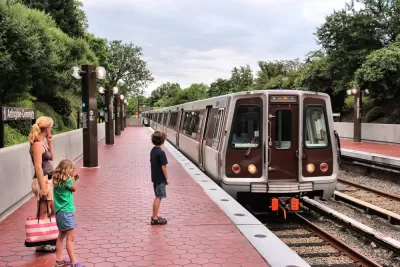The historically car-dependent county is hoping the planned revitalization of the Blue Line Corridor will boost the local economy and help maintain affordable housing.

In what Ethan Goffman calls "a radical break for a county with a history of developing in 'a spread out and automobile dependent' fashion," Maryland's Prince George’s County "has signed on to the transit-oriented development (TOD) revolution to boost its economy while helping the environment." According to the plan, "The Blue Line Corridor will become a major economic engine for the County by catalyzing development, creating jobs, and incentivizing the development of a sports and entertainment-branded corridor."
"The Blue Line would be the template for a much-needed economic boost for Prince George’s County that simultaneously helps the environment and maintains affordable housing." The plan "emphasizes business and economic development, crucial in a county with plenty of housing but relatively few jobs." Its authors hope it will attract large, institutional employers and raise the average annual salary in the area to a level closer to the rest of the D.C. region. "The plan’s second broad goal is to increase commercial tax collection by $100 million annually, enhancing much-needed local services. Third is increasing the population by 50,000 in areas near transit, including a mix of incomes and housing types."
"The plan’s fourth goal is preserving affordable housing and a diverse housing stock even in the midst of growth." The county also hopes to "increase food retail options in low-income areas to make fresh, healthy food widely accessible" and enhance "identifiable character" through public features and amenities.
"The plan is proactive on [the issue of displacement], calling for building 26,000 new residential units, 75% of which would be dedicated as affordable to households making less than 120% of the area median income," which could help fill the need for so-called 'missing middle' housing.
FULL STORY: Prince George’s County outlines plans for ambitious transit-oriented development along the Blue Line

Alabama: Trump Terminates Settlements for Black Communities Harmed By Raw Sewage
Trump deemed the landmark civil rights agreement “illegal DEI and environmental justice policy.”

Study: Maui’s Plan to Convert Vacation Rentals to Long-Term Housing Could Cause Nearly $1 Billion Economic Loss
The plan would reduce visitor accommodation by 25% resulting in 1,900 jobs lost.

Planetizen Federal Action Tracker
A weekly monitor of how Trump’s orders and actions are impacting planners and planning in America.

Study Links Covid and Poor Driving
The effects of the virus, including ‘brain fog,’ can make driving more difficult and dangerous.

Waymo Gets Permission to Map SF’s Market Street
If allowed to operate on the traffic-restricted street, Waymo’s autonomous taxis would have a leg up over ride-hailing competitors — and counter the city’s efforts to grow bike and pedestrian on the thoroughfare.

Parklet Symposium Highlights the Success of Shared Spaces
Parklets got a boost during the Covid-19 pandemic, when the concept was translated to outdoor dining programs that offered restaurants a lifeline during the shutdown.
Urban Design for Planners 1: Software Tools
This six-course series explores essential urban design concepts using open source software and equips planners with the tools they need to participate fully in the urban design process.
Planning for Universal Design
Learn the tools for implementing Universal Design in planning regulations.
Caltrans
Smith Gee Studio
Institute for Housing and Urban Development Studies (IHS)
City of Grandview
Harvard GSD Executive Education
Toledo-Lucas County Plan Commissions
Salt Lake City
NYU Wagner Graduate School of Public Service


























